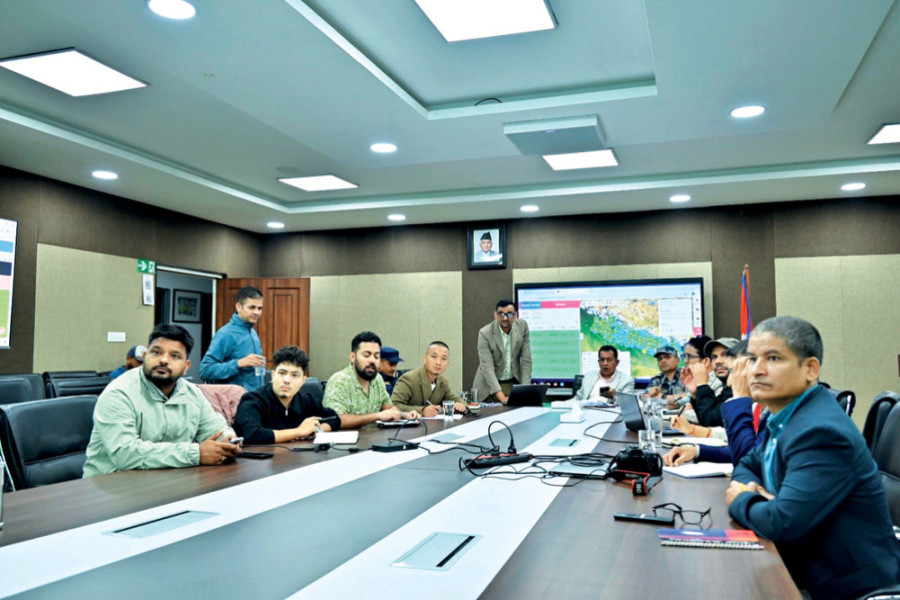National
Hami Nepal at disaster preparedness meet: Was it a protocol breach?
Information officer at NDRRMA says working with non-governmental and volunteer organisations is not new.
Post Report
After a video surfaced showing Hami Nepal founder Sudan Gurung speaking at a meeting of the National Disaster Risk Reduction and Management Authority (NDRRMA), an online debate started.
Beyond questions about Gurung’s eligibility to attend the meeting or allegations that he issued directives to government officials, there has been another much-asked question. How can bodies outside the government, such as non-profit groups, NGOs, INGOs, and volunteer groups, participate in disaster management meetings?
Even after Home Minister Om Prakash Aryal clarified that Gurung was invited for his experience and expertise in disaster response, and that he had offered suggestions, not instructions, criticism persists.
Many continue to question whether the government’s engagement with groups like Hami Nepal in such official platforms crosses a line of propriety and precedent, signalling weakness or undue external influence in state affairs.
So, is the participation of the non-profit organisation Hami Nepal in what the Chief of NDRRMA described as an ‘informal meeting’ truly ‘ungovernmental’, ‘unprecedented’, or outside protocol, as many social media users have claimed?
Legally, it is not. According to Section 4(6), Chapter 2 of the Disaster Risk Reduction and Management Act, 2074 (2017), the Council “may, as necessary, invite representatives from relevant bodies, organisations, or experts to attend the meeting.”
The Act, in Section 3(1), further defines the Council as “a National Council for Disaster Risk Reduction and Management” established to effectively conduct disaster management activities, a national-level body chaired by the Prime Minister and responsible for formulating and coordinating disaster-related policies.
Additionally, Section 10 of the same Act provides for the formation of the National Disaster Risk Reduction and Management Authority (NDRRMA).
These provisions make clear that the participation of non-governmental actors like Gurung or Hami Nepal is not outside protocol or legal precedent. The law explicitly allows the inclusion of relevant experts and organisations when the Council deems their input necessary for effective disaster management.
While many have called Hami Nepal’s engagement unprecedented, Shanti Mahat, information officer at the NDRRMA, stressed that working with non-governmental and volunteer organisations is not something new.
Engaging with stakeholders outside the government, including through virtual consultations, has been part of their approach. “During times of crisis, the support of all bodies, whether governmental or non-governmental, is essential,” she said.
“Over the years, we have even signed memorandums of understanding with private health organisations, rafting groups, and drone operators,” Dinesh Prasad Bhatta, chief of NDRRMA, said. “During disasters and emergencies, numerous NGOs, INGOs, and volunteering networks collaborate with us — because crises, after all, concern every citizen.”
He pointed out that during every major crisis, earthquakes, landslides, and the Covid-19 pandemic, the government has relied on the support of civil society and volunteer groups.
“It has never been only the government at work,” he said. “Volunteers and various organisations have always stepped in to help.”
The culture of volunteering is a tremendous asset for Nepal, says Bhatta. As per him, in other countries, people respond only after appeals are made, but in Nepal, volunteer groups consistently come forward on their own.
Bhatta explained that in such a situation, volunteer groups seeking operational details from NDRRMA, like the number of helicopters or police personnel deployed, are valid. That is part of assessing the situation and identifying where help is most needed.
“We always welcome volunteering groups during times of crisis,” he said. “If someone with expertise and resources wants to volunteer, that should never be viewed negatively. Their initiative is meant to support relief efforts, not undermine them.”




 14.12°C Kathmandu
14.12°C Kathmandu














